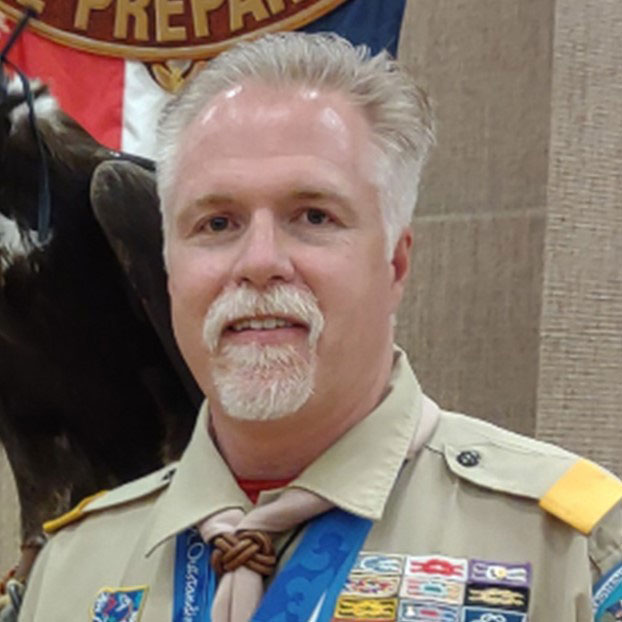With schools recently going through the graduation process or applying to college or a career, we often hear, “How do I describe being an Eagle Scout on a resume or application so that someone who doesn’t know about it will know its importance?”
That being said, we wanted to find and provide several ways to address the value of being an Eagle Scout to those who do not know what it takes to become one.
How do I describe being an Eagle Scout or what it means in detail?
Being an Eagle Scout means you are a person of good character, caliber, and trustworthiness who can finish long and complicated steps to achieve a goal. To rise in rank, one must pass more than 200 requirements while demonstrating skills and proficiency over a minimum of 24 months. Then there are at least 21 merit badges with unique complexity that introduce you to multiple skills, hobbies, and careers. 14 of those are required and can take a minimum of 90 days. Proving that you can stick to processes and procedures, which are very valuable to the School or Employer.
In Scouting America’s 115-year history, over 130 million youth have participated—yet only about 2.75 million have earned the rank of Eagle Scout. That places you among the very few who have completed the rigorous requirements, demonstrated sustained commitment, and shown exceptional leadership.
Earning Eagle isn’t just an award—it’s a clear signal that you follow through, rise to challenges, and lead with resilience. Who wouldn’t want that on their team?
What are the Key Highlights they should know?
- Identify and articulate a few points of the Scout Law and Oath that will be an integral part of what they are looking for in a great candidate. Loyalty, integrity, and honesty all come to mind and are needed more than ever. Perhaps in the interview, recite those 12 points and the Oath so they know what you subscribe to.
- A desire to achieve and get things done, a weekly commitment to process improvement, proficiency in a range of skills, including goal setting, and serving in multiple leadership positions for 18+ months all became progressively harder, as did the number of people that you led or supervised. This helps to demonstrate that you can work well in groups and lead when others aren’t sure how to take the reins.
- Your Eagle Scout Service Project took several hours researching how to leave a lasting legacy in the community. Then there is the planning, problem solving, working with various skill levels and ages of youth and adults, completing the project reports, and presenting your project for final approval. Don’t forget to include how you must work with your troop leaders, district and council leaders, and community and beneficiary leaders to secure approval. Include how your project made a difference in the community and how you want to make a difference in the world with the degree you are earning or the position in that company.
- Focus on better citizenship within your community, across society, and throughout the nation while fostering a global awareness of your role in the world. This approach emphasizes the importance of working together and understanding diverse customs and traditions to build a better society. It is reinforced through hands-on community involvement such as parades, placing flags on veterans’ graves, small-group service projects, and conservation efforts.
- Problem-solving through hands-on learning, goal-oriented, planning-executing, and reporting to a board for evaluation or completion. Colleges and Businesses alike are always looking for people who try to solve challenges instead of waiting for others to solve them for them.
- If there are special or specific questions that the application requires or addresses, think of detailed scouting activities that you have been on that would relate or demonstrate a keen understanding of the topic. Include what you learned and how observing other leaders built a foundation for you, and that you want to give back to others.
Additional Highlights, Resources, and Impacts
- Many Scouts take part in high-level extracurricular opportunities that go beyond local involvement. Programs like the Order of the Arrow—Scouting’s National Honor Society, Philmont, National Jamborees, and NYLT (National Youth Leadership Training) provide advanced experiences in leadership, teamwork, and personal growth. These council- and national-level events often require fundraising, planning, and a strong personal commitment to attend. Participating in these programs shows that you didn’t just meet expectations—you exceeded them. You sought challenges, invested in your development, and consistently went above and beyond.
Why Does Belonging to NESA Help?
Belonging to the National Eagle Scout Association (NESA) demonstrates that you are in good standing and still subscribe to the Scout Oath and Law, which will also be beneficial. Aside from that, there is the networking with other leaders who can help mentor or work together, all of the scholarships that NESA gives out to Eagles every year, and getting involved with service opportunities on the campus. To join, go to nesa.org. It’s quick and straightforward when you have your Eagle Information in front of you.
Adding It All Up
All of this adds up to you being a great asset to the community, the school, and the place of business, and one that will excel, do their Best, and lead others with the best interests in mind. Being an Eagle Scout is still relevant and certainly a needed asset wherever you land. Take the highlights from your scouting experience and the trail to the Eagle, and help them understand the bigger picture to help you stand out or to elevate their understanding that an Eagle Scout is as important to society in 2025 as it was over the last 115 years.
We at NESA would love to hear how this has helped you or if there are other ways we can support your journey. Share your thoughts with us at nesa@scouting.org.


